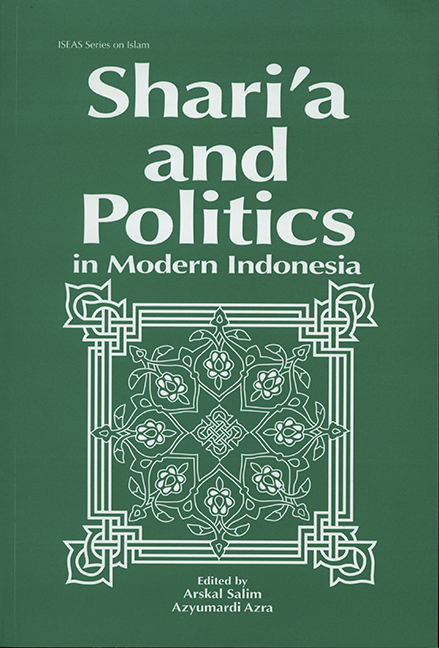Book contents
- Frontmatter
- Contents
- Acknowledgments
- List of Contributors
- Glossary
- 1 INTRODUCTION: The State and Shari'a in the Perspective of Indonesian Legal Politics
- 2 LAW AND POLITICS IN POST-INDEPENDENCE INDONESIA:A Case Study of Religious and Adat Courts
- 3 THE STATE AND SHARI'A IN INDONESIA
- 4 THE STATE'S LEGAL POLICY AND THE DEVELOPMENT OF ISLAMIC LAW IN INDONESIA'S NEW ORDER
- 5 THE INDONESIAN MARRIAGE LAW OF 1974: An Institutionalization of the Shari'a for Social Changes
- 6 INDONESIA'S 1989 RELIGIOUS JUDICATURE ACT: Islamization of Indonesia or Indonesianization of Islam?
- 7 THE POLITICAL BACKDROP OF THE ENACTMENT OF THE COMPILATION OF ISLAMIC LAWS IN INDONESIA
- 8 ISLAMIZING CAPITALISM: On the Founding of Indonesia's First Islamic Bank
- 9 FATWA AND POLITICS IN INDONESIA
- 10 ZAKAT ADMINISTRATION IN POLITICS OF INDONESIAN NEW ORDER
- 11 ISLAMIC VALUES, LAW AND EXPECTATIONS IN CONTEMPORARY INDONESIA
- 12 EPILOGUE: Shari'a in Indonesia's Current Transition: An Update
- APPENDICES
- Bibliography
- Index
9 - FATWA AND POLITICS IN INDONESIA
Published online by Cambridge University Press: 21 October 2015
- Frontmatter
- Contents
- Acknowledgments
- List of Contributors
- Glossary
- 1 INTRODUCTION: The State and Shari'a in the Perspective of Indonesian Legal Politics
- 2 LAW AND POLITICS IN POST-INDEPENDENCE INDONESIA:A Case Study of Religious and Adat Courts
- 3 THE STATE AND SHARI'A IN INDONESIA
- 4 THE STATE'S LEGAL POLICY AND THE DEVELOPMENT OF ISLAMIC LAW IN INDONESIA'S NEW ORDER
- 5 THE INDONESIAN MARRIAGE LAW OF 1974: An Institutionalization of the Shari'a for Social Changes
- 6 INDONESIA'S 1989 RELIGIOUS JUDICATURE ACT: Islamization of Indonesia or Indonesianization of Islam?
- 7 THE POLITICAL BACKDROP OF THE ENACTMENT OF THE COMPILATION OF ISLAMIC LAWS IN INDONESIA
- 8 ISLAMIZING CAPITALISM: On the Founding of Indonesia's First Islamic Bank
- 9 FATWA AND POLITICS IN INDONESIA
- 10 ZAKAT ADMINISTRATION IN POLITICS OF INDONESIAN NEW ORDER
- 11 ISLAMIC VALUES, LAW AND EXPECTATIONS IN CONTEMPORARY INDONESIA
- 12 EPILOGUE: Shari'a in Indonesia's Current Transition: An Update
- APPENDICES
- Bibliography
- Index
Summary
The aim of this chapter is to demonstrate how Indonesian fatawa (plural for fatwa) gave response to politics and government policies from 1926 up to 1998. It also shows how political situations influenced the issuance of fatawa and, at the same time, how fatawa influenced the Indonesian political atmosphere. Until the beginning of the twentieth century,ijtihad in Indonesia was performed by individual ulama. In the second quarter of the twentieth century, the practice of ijtihad as performed by the ulama in groups began. In 1926, traditionalist ulama founded the Nahdlatul Ulama (NU) organization, and it began issuing fatawa as early as during its first congress. The modernist Muhammadiyah organization, which was founded in 1912, did not concern itself with fatwa until 1927 when it created a special committee called Majelis Tarjih to deal with religious issues in general and Islamic law in particular.
Although fatawa issued by certain individual ulama could still be observed, the tendency was for more and more ulama to identify themselves with one of those two poles: the NU or Muhammadiyah. A new development emerged when the Council of Indonesian Ulama (Majelis Ulama Indonesia, or MUI) was established in 1975. Both the traditionalist and the modernist ulama are represented in the MUI through which they issue joint fatawa.
Unlike in Egypt and Saudi Arabia, Indonesia does not have a grand mufti. Fatawa are issued collectively by Islamic organizations. The characteristics of Indonesian collective ijtihad (ijtihad jama'i are as follows: firstly, before issuing fatawa, each organization holds a meeting attended by their ulama and – if necessary – other scholars. They discuss the subject, and the conclusion of the meeting is issued as a fatwa from that particular organization. Secondly, the characteristics of pluralism, which makes Indonesian fatwa unique, can be seen. Indonesia has many Islamic organizations such as the NU, Muhammadiyah, and the MUI, each of which consists of separate branches in more than twenty provinces. It is possible that a fatwa from one organization may differ from those of other organizations. It can also happen that a fatwa issued from the national organization is different from one given by the provincial organization
- Type
- Chapter
- Information
- Shari'a and Politics in Modern Indonesia , pp. 168 - 180Publisher: ISEAS–Yusof Ishak InstitutePrint publication year: 2003



